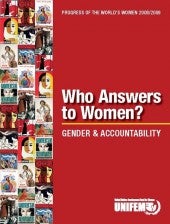Progress of the World’s Women 2008/2009: Who Answers to Women?
While great strides have been made in commitments to women's rights, there is a long way to go to fully realize these rights. At present, at least 1 in 3 women and girls are victim to gender-based violence, 60 percent of all unpaid family workers globally are women and 57 percent of children out of school are girls. Additionally, only six out of 48 landmark resolutions and commitments for gender equality have time-bound targets. Whether from a politics, employment, family, educational, property or public services standpoint, women face many more challenges ahead of them in achieving equality.
Progress of the World's Women 2008/2009: Who Answers to Women? demonstrates that one of the most powerful constraints on realizing women's rights and achieving the Millennium Development Goals (MDGs) is a deficit of accountability to women. It, therefore, puts forth a framework to understanding accountability form a gender perspective and outlines innovative measures states and international institutions are taking to increase accountability. It focuses particularly on five areas where the need to strengthen accountability to women is urgent: politics and governance, access to public services, economic opportunities, justice, and the distribution of international assistance for development and security.
UNIFEM's (now UN Women) flagship biennial report comes at just over the halfway mark of the MDGs, a set of eight time-bound targets to meet the needs of the world's poorest by 2015. Progress has been mixed, especially in achieving the third MDG, gender equality and women's empowerment. This report, however, features new data to call for stronger accountability systems to ensure that women's rights become a reality worldwide.










